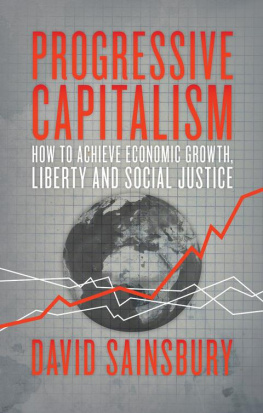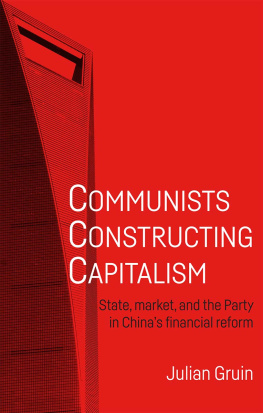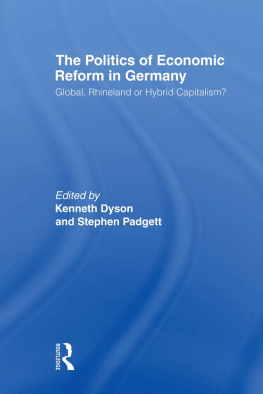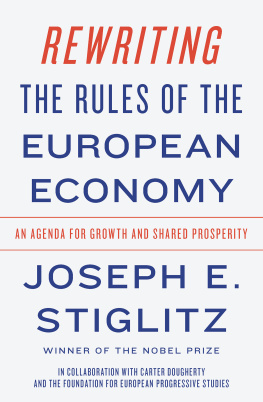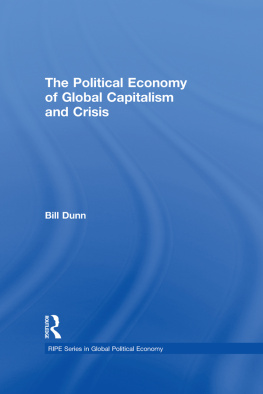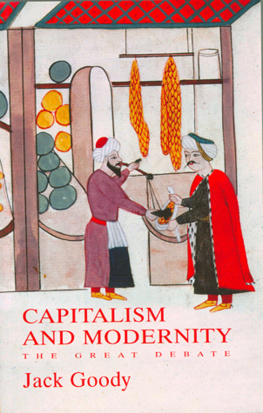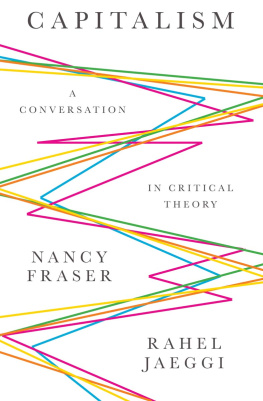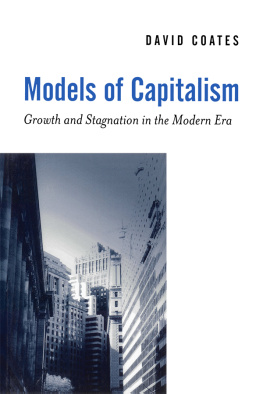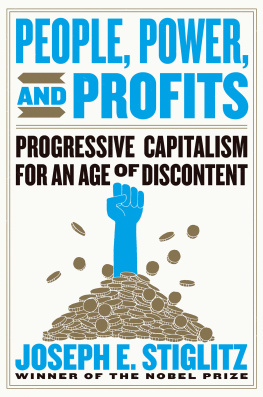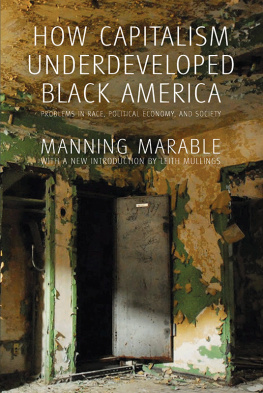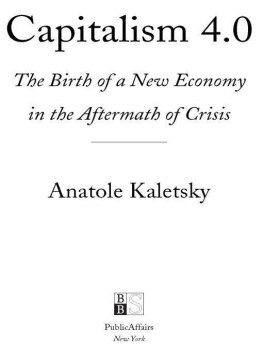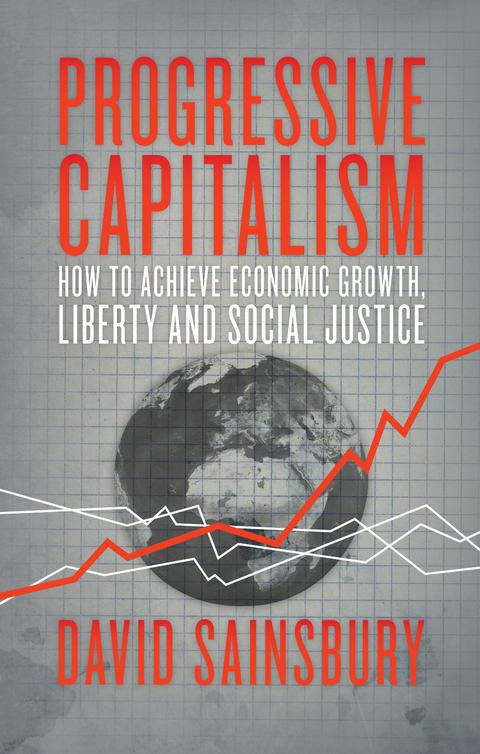To my wife Susie and my daughters Clare, Lucy and Francesca, who share the values on which this book is based, and without whose loving support this book would not have been written.
The present state of the nations is the result of the accumulation of all discoveries, inventions, improvements, perfections and exertions of all generations which have lived before us: they form the mental capital of the present human race, and every separate nation is productive only in the proportion in which it has known how to appropriate these attainments of former generations and to increase them by its own acquirements.
W hen in 1998 I became Minister of Science and Innovation in the Department of Trade and Industry in Tony Blairs Labour government, I believed the policies we had developed in opposition would increase the prosperity of the country and create a fairer society. But in government I gradually came to realise that our thinking largely reflected the dominant neo-liberal political economy of the time, which was not a useful basis for developing policies to achieve our goals. Across the government there was also a lack of understanding about the nature of economic growth and competition in the global economy, and science and innovation were seen as of marginal importance.
In the field of science and innovation, with the enthusiastic support of Gordon Brown, I think we made some important and useful reforms, as well as greatly increasing the funds for research and knowledge transfer. But it was on too small a scale, and I have no doubt we could have had a larger impact if, before coming into government, we had developed a Progressive political economy which provided us with a more realistic model of capitalism for policy-making purposes. We would also have stood a better chance of seeing the institutional failures that were gradually developing in financial markets. In retrospect, however, it is not surprising we didnt develop such a Progressive political economy because to do so would have meant going against the whole tide of economic thinking at the time.
During my time in government I also became increasingly aware, as a result of many trips to China, Taiwan and South Korea, of the challenge that Western governments were beginning to face as a result of globalisation, the fast growth of the countries of Asia, and the fact that, as a result of the collapse of Communism in Russia, Chinas shift to market capitalism and Indias dismantling of its command-and-control economy, 1.5 billion more low-paid workers had entered the worlds labour market.
It was only after I had left government after eight years, however, that I began to question fundamentally the neo-liberal political economy which had dominated the economic policies of governments in the Western world for the last thirty-five years, and form the view that if as a country we were going to rise to the challenge of restructuring our economy to meet the dynamic changes taking place across the world, we would need a new Progressive political economy. This would need to be based on a better understanding of the process of economic growth, and give a new answer to the central question of political economy: what is the role of government in the economy?
My re-evaluation of the prevailing neo-liberal political economy began with a final report on the governments science and technology policies, which I wrote at the request of Gordon Brown, and which I called The Race to the Top. The research for this report strengthened my conviction that there was no way that UK firms could compete with firms in countries like China and India on the basis of price, and that the only way we could compete in the future was on innovation and upgrading the goods and services we sell. We should see ourselves as involved in a race to the top, not a race to the bottom. But while the report was enthusiastically supported by Gordon Brown, most politicians and Treasury civil servants seemed unable to take on board the basic message of the report, and this was due to their adherence to neo-liberal ideas.
The second event that greatly affected my thinking was having to fight off a private equity takeover bid for the family business during the summer of 2007. There was not the slightest pretence of seeking to improve the performance of the company, and it was made clear that the current management team, strategy and capital expenditure plans of the business would be kept in place. The only change they proposed to make was to sell off all the properties of the company and replace them with massive debts. Then they would put the company back on the market, stressing the high return on equity but not the high risks involved, and walk away with 1 billion of profit.
This bid, which had the backing of the City, due to the 100 million of fees the investment banks would earn if it went ahead, seemed to me to be a perfect example of wealth appropriation as opposed to wealth creation, that is to say, it was economic behaviour which aimed to extract value from other participants in the economy without making any contribution to productivity. The bid failed because members of the founding family refused to accept it on the grounds that it would put the future of the business at risk, but the fact that the bid had been made reinforced my view that financial markets were becoming increasingly dysfunctional.
The third event which affected my thinking was, of course, the financial crash of 2008 itself. The coalition government sought to portray it as being the result of the failure of the previous Labour government to control public expenditure. In retrospect the Labour government should have used the opportunity of a strongly growing economy to reduce the deficit, as this would have reduced the pressure on the government to cut back public expenditure at a time when the economy was struggling to lift itself out of a recession. There is a lot to be said for fixing the roof when the sun is shining, though I dont remember the Conservative opposition ever making this point when it was shining.
It was also, of course, not the main reason for the financial crash of 2008, which was due to the bursting of a housing bubble accompanied by a massive institutional failure of the financial markets in many parts of the world. The fact that the coalition government, because of its ideological mindset, did not see that there had been a massive failure of the financial markets, and that it was necessary to bring in a major programme of financial reform, hardened my conviction that the neo-liberal political economy, to which they were still clinging, needed to be challenged and a new Progressive political economy put in its place.
I also formed the view that this new Progressive political economy, as well as being based on a better understanding of the process of economic growth, would need to incorporate three defining beliefs of Progressive thinking. The first is the importance of institutions, which can be defined for this purpose as the rules and regulations which society develops so that a specific area of activity functions more effectively.
The second defining belief of Progressive thought concerns the role of the state. Neo-liberals believe that a countrys economic institutions start up and evolve spontaneously, but Progressive thinkers believe that the design of institutions involves resolving conflicting interests, and also creates winners and losers, and that an active and competent state has, therefore, to be involved.
And, thirdly, while neo-liberals believe that the performance of an economy should simply be assessed in terms of economic growth and freedom, Progressive thinkers believe that some measure of social justice should be used, and in this book I argue that social justice defined as fairness is the best one.

